高中英语 Unit 1Laugh out loud 外研版 选择性必修一
文档属性
| 名称 | 高中英语 Unit 1Laugh out loud 外研版 选择性必修一 |
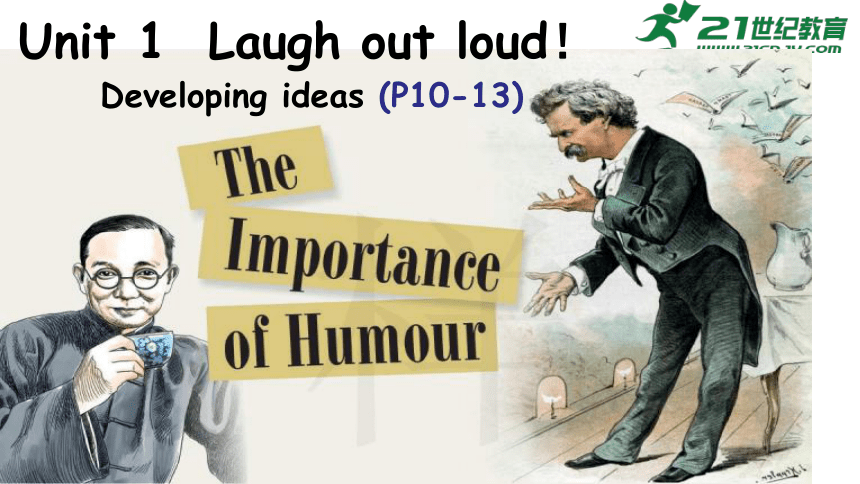
|
|
| 格式 | pptx | ||
| 文件大小 | 12.7MB | ||
| 资源类型 | 试卷 | ||
| 版本资源 | 外研版(2019) | ||
| 科目 | 英语 | ||
| 更新时间 | 2024-09-14 00:00:00 | ||
图片预览

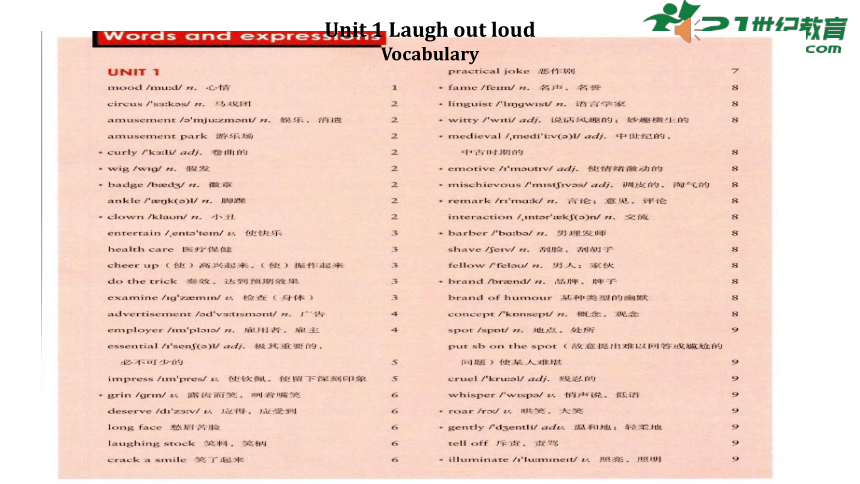
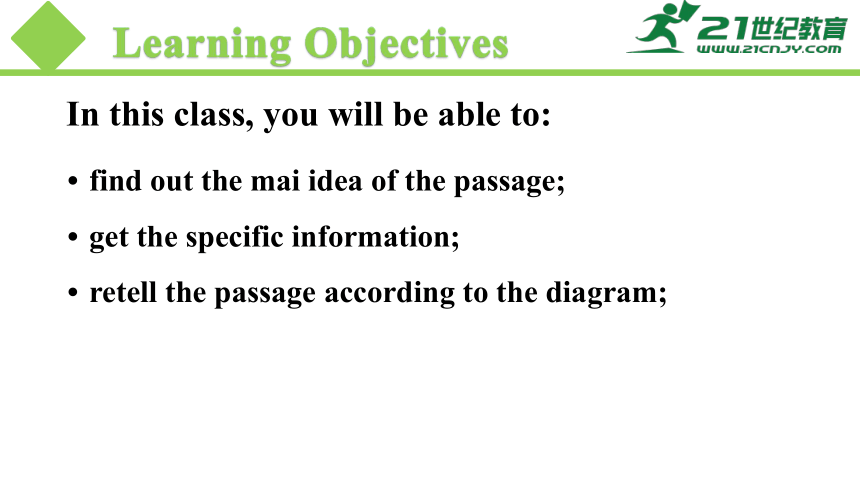
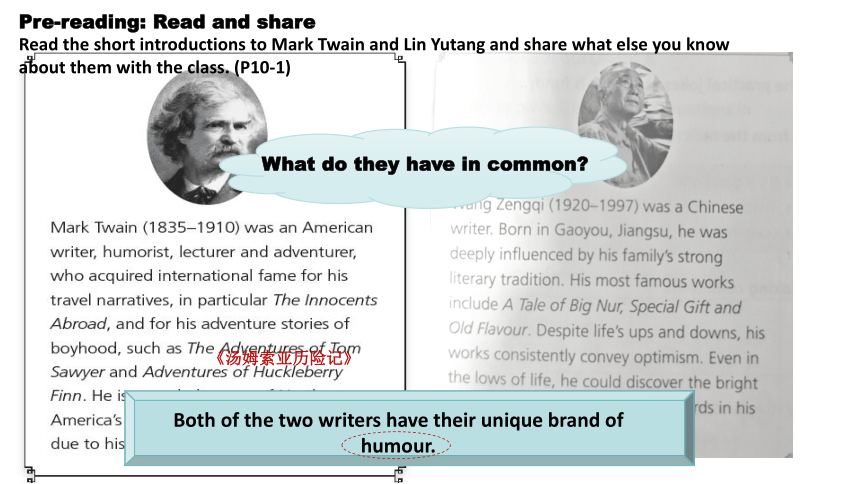

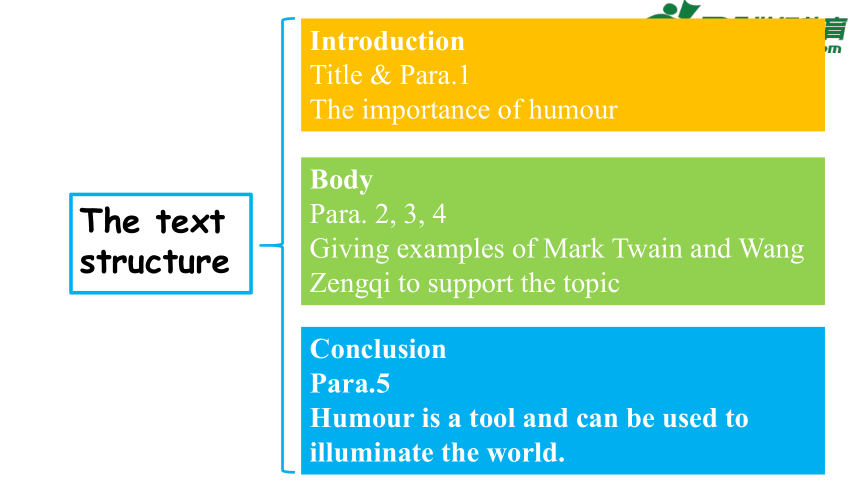
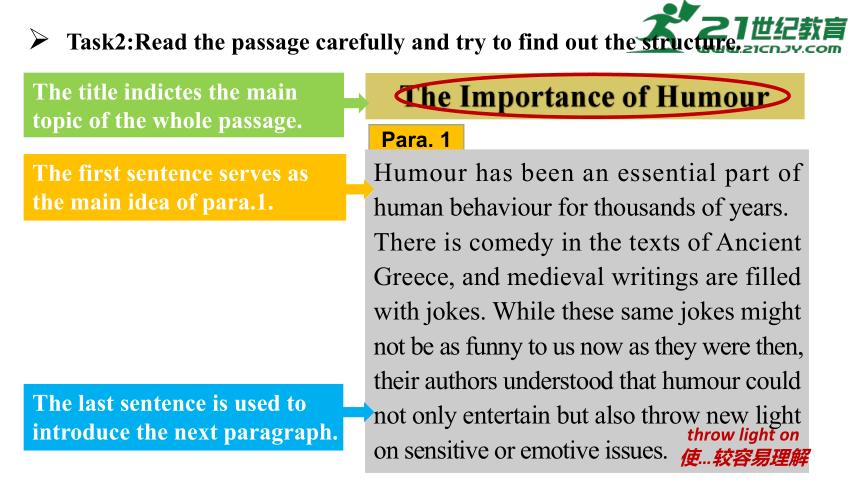

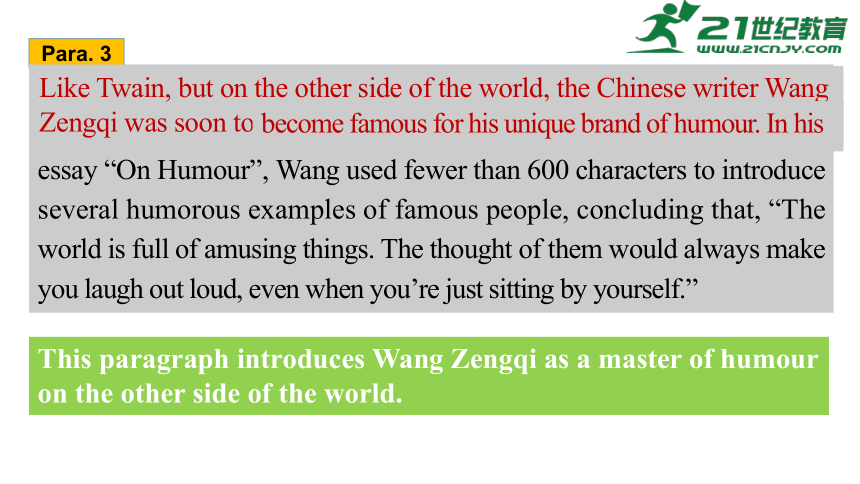
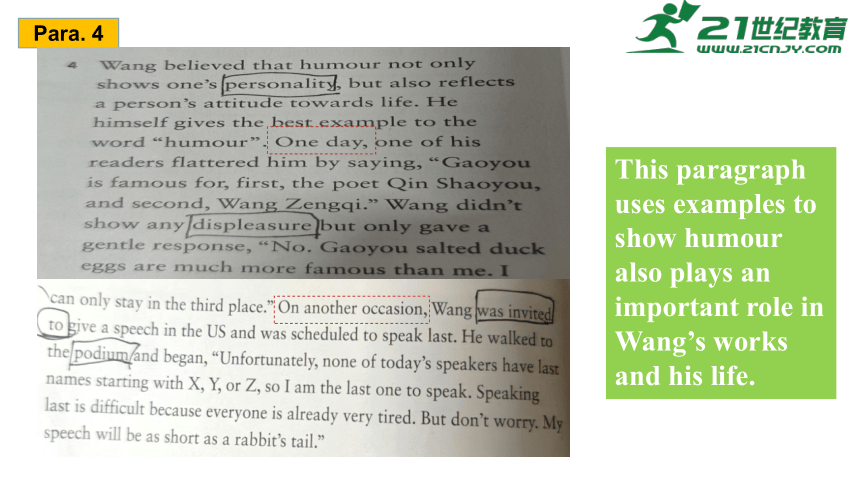
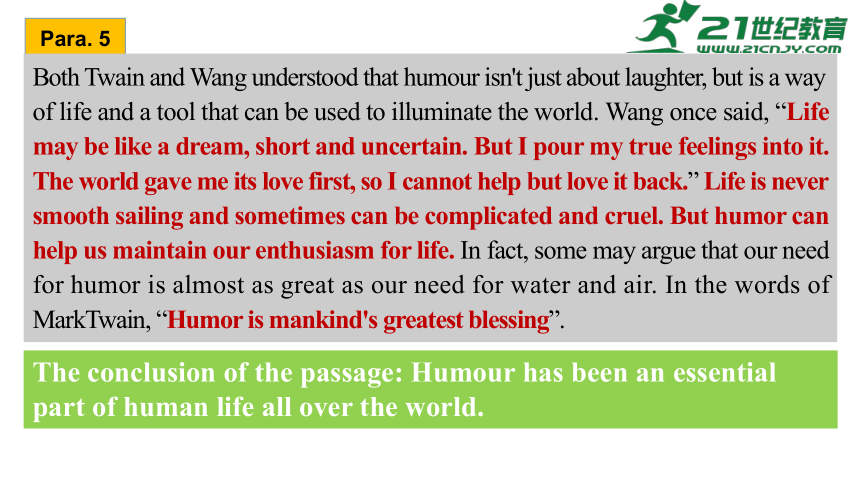

文档简介
(共31张PPT)
Developing ideas (P10-13)
Unit 1 Laugh out loud!
Unit 1 Laugh out loud
Vocabulary
Learning Objectives
· find out the mai idea of the passage;
· get the specific information;
· retell the passage according to the diagram;
In this class, you will be able to:
《汤姆索亚历险记》
Pre-reading: Read and share
Read the short introductions to Mark Twain and Lin Yutang and share what else you know about them with the class. (P10-1)
What do they have in common
Both of the two writers have their unique brand of humour.
While-reading
Task1: read the passage quickly and analyze the structure of passage.
Introduction
The importance of humour
Body
Giving examples of Mark Twain and Wang Zengqi to support the topic
Conclusion
Humour is a tool and can be used to illuminate the world.
Para. 2, 3, 4
Title & Para.1
Para.5
Introduction
Title & Para.1
The importance of humour
Body
Para. 2, 3, 4
Giving examples of Mark Twain and Wang Zengqi to support the topic
Conclusion
Para.5
Humour is a tool and can be used to illuminate the world.
The text structure
Para. 1
Task2:Read the passage carefully and try to find out the structure.
The Importance of Humour
Humour has been an essential part of human behaviour for thousands of years.
There is comedy in the texts of Ancient Greece, and medieval writings are filled with jokes. While these same jokes might not be as funny to us now as they were then,
their authors understood that humour could not only entertain but also throw new light on sensitive or emotive issues.
The title indictes the main topic of the whole passage.
The first sentence serves as the main idea of para.1.
The last sentence is used to introduce the next paragraph.
throw light on
使…较容易理解
Para. 2
Closer to modern times, someone who is remembered for his ability to combine humour with more serious messages is American writer, Mark Twain. Twain's particular style of writing is funny and often mischievous. For example, in his classic novel The Adventures of Tom Sauyer, he famously says, “Writing is easy. All you have to do is cross out the wrong words.” But he is equally well known for his witty remarks in his everyday interactions with people. For instance, while on a lecturing tour of the United States, Twain went into a barber's shop to get a haircut and a shave. The barber, not recognising him, asked if he had a ticket to the lecture. When Twain replied that he didn't, the barber told him that if he wanted to go to the event he would have to stand, as there were no seats left in the theatre. Twain's response was, "That's just my luck. I always have to stand when that fellow lectures!"
This paragraph uses examples to show humour plays an important role in Mark Twain’s works and his life.
For example,
For instance,
划掉
Para. 3
Like Twain, but on the other side of the world, the Chinese writer Wang Zengqi was soon to become famous for his unique brand of humour. In his essay “On Humour”, Wang used fewer than 600 characters to introduce several humorous examples of famous people, concluding that, “The world is full of amusing things. The thought of them would always make you laugh out loud, even when you’re just sitting by yourself.”
This paragraph introduces Wang Zengqi as a master of humour on the other side of the world.
Like Twain, but on the other side of the world, the Chinese writer Wang Zengqi was soon to
become famous for his unique brand of humour. In his
Para. 4
This paragraph uses examples to show humour also plays an important role in Wang’s works and his life.
Para. 5
Both Twain and Wang understood that humour isn't just about laughter, but is a way of life and a tool that can be used to illuminate the world. Wang once said, “Life may be like a dream, short and uncertain. But I pour my true feelings into it. The world gave me its love first, so I cannot help but love it back.” Life is never smooth sailing and sometimes can be complicated and cruel. But humor can help us maintain our enthusiasm for life. In fact, some may argue that our need for humor is almost as great as our need for water and air. In the words of MarkTwain, “Humor is mankind's greatest blessing”.
The conclusion of the passage: Humour has been an essential part of human life all over the world.
Appreciation
Mark Twain
Remebered for ability to _________________with more ________________.
Writing style:_________________
Example:_____________________
Also well known for his witty remarks
Example:_____________________
Task3:Organize information from the passage and complete the diagram.
Introduction
Humour is an essential part of _______________. Authors have used it to ________and throw new light on___________________________
human behavior
entertain
sensitive and emotive issues
Conclusion
Humour is a ___________ and a tool that can be used to
____________________.
way of life
illuminate the world
combine humour
funny&mischievous
serious messages
The Adventures of Tom Sauyer
A talk with a barbar
Wang Zengqi
Famous for his unique brand of humor
He believed that:
__
_________________________
Example1:
___________________
Example2:
________________________
humour not only show one’s personality, but also reflects a person’s attitude towards life.
Gaoyou salted duck eggs
the order of speech
Post-Reading
Work in groups. Discuss and present your opinion.
How can a sense of humour help you in your daily life Give an example.
Language points
(P10-12)
Unit 1 Laugh out loud!
新外研版选择性必修Book 1
Para1 补充知识点
1. essential / sen ( )l/ adj. 极其重要的,必不可少的 n.必需品
→essentially adv. 本质上, 根本上
(1) be essential to sth./sb. 对某物/人来说必不可少的
eg: 幽默对我来说必不可少。
(2) it is essential (for sb)to do sth. (对某人来说)做某事是完全必要的
eg:对我来说学习英语是完全必要的。
Humor is essential to me.
It is essential for me to learn English.
2. entertain / ent te n/ v. 使快乐;招待
(1) entertain sb. with sth 用某物逗某人快乐
(2) →entertainment n. 娱乐活动;招待
→entertaining adj. 愉快的,有趣的
eg: She entertained the children with stories and songs.
3. emotive /i m t v/ adj. 使情绪激动的
→ emotion n.情绪,情感 → emotional adj.情感的
Para2 补充知识点
3. interaction / nt r k ( )n/ n. 交流; 相互作用,相互影响
interaction between ...and... ...和...之间的交流、相互作用
eg: He praised the interaction between performers and their audience.
interaction with... 和.....的互动
interact vi.相互交流;相互影响
interact with... 与....交流/相互作用
4.recognize v.认识,辨认出;承认,意识到 n.recognition
1. combine A with B 把A和B结合起来
2. for instance = for example 例如
Para3,4,5 补充知识点
1. be full of = be filled with... 充满......
2.personality n.个性
补充:personal adj.个人的,私人的 eg: 个人风格/观点
3.displeasure n.不愉快
补充:反义词:pleasure n.愉快
4. be invited to do sth. 被邀请干某事 eg: 我被邀请打篮球。
invite sb. to do sth. 邀请某人干某事 eg:我邀请好朋友去购物。
personal style/ idea
I am invited to play basketball.
I invite my good friend to go shopping.
Grammar
If we think of grammar as the crystal of the enemy,
do you want to achieve a victory
全军出击
我喜欢一款叫做王者荣耀的游戏。(汉译英)
啰嗦重复版:I like a game. It/The game is called “Honor of Kings”.
改进版:I like a game that is called “Honor of Kings”.
欢迎进入定语从句(The Attributive clause)
I like a game that is called “Honor of Kings”.
clause
main sentence
relatives
antecedent
注意
①Relatives are equal to antecedent.
②关系词起到了一个连接的作用
※③Antecedent shouldn’t appear in the attributive clause!!
错误示范:I like a game that it/the game is called “Honor of Kings”.
制胜连招
先行词
如果是关系代词
如果是关系副词
关系代词 充当句子成分 被修饰的先行词
who 主语、宾语 指人
whom 宾语 指人
whose 定语 指人或指物
that 主语、宾语、表语 指人或指物
which 主语、宾语 指物
When 表示时间,在定语从句中做时间状语。
Why 表示原因,在定语从句中做原因状语。
Where 表示地点,在定语从句中做地点状语。
关副用法口诀
时间_____
地点______
原因_______
关代用法口诀
是人就用_____
宾语可用______
非人用_______
_______都可以
谁的用_______
who
whom
which
that
whose
when
where
why
实战模拟
1.We like this teacher ( ) is giving us a lecture.
2.You are the only one ( ) advice he might listen to.
3.I still remember the first time ( ) I met my deskmate.
who
whose
when
关代用法口诀
是人就用_____
宾语可用______
非人用_______
_______都可以
谁的用_______
who
whom
which
that
whose
关副用法口诀
时间_____
地点______
原因_______
when
where
why
战况回顾
a compound sentence
main sentence and clause, antecedent and relatives
How to choose relatives?
Pay attention to 3 points(the third one is the most important!)
who
whom
which
that
whose
关代用法口诀
是人就用_____
宾语可用______
非人用_______
_______都可以
谁的用_______
关副用法口诀
时间_____
地点______
原因_______
when
where
why
1.I walk through the doors into the waiting area,where there's a familiar atmosphere of boredom and tension.
2.People sit uncomfortably on plastic chairs,looking through old magazines,all of which have been read hundreds of times previously.
3.In the middle of this particular scene I spot a small girl whose ankle is twice its normal size.
4.I speak with the on duty nurse,who tells me that Lara's parents rushed her to the hospital...
5.Scientific studies show that laughter produces chemicals to make people feel better,which means clown doctors can be helpful.
Read and underline the attributive clauses.
限制性定语从句
非限制性定语从句
非限制性定语从句
非限制性定语从句
非限制性定语从句
一、限制性定语从句与非限制性定语从句概述
1.限制性定语从句通常紧跟在先行词之后,对先行词起限制确定作用。从句和先行词的关系十分密切,两者之间一般不可用逗号隔开。
She has found the necklace (that) she lost two weeks ago.
她找到了那条两周前丢失的项链。
2.非限制性定语从句是对先行词的一个补充说明。没有它,主句也能独立存在;非限制性定语从句和先行词的关系不是很密切,两者之间用逗号隔开。
He has two sisters,who are working in the city.
他有两个姐姐,她们在城里工作。
限制性定语从句 非限制性定语从句
标点符号 无逗号 有逗号隔开
关系词的选用 who,whom,whose,that,which when,where,why 不可用that或why
翻译 从句内容置于先行词前 从句主句分开翻译
二、限制性定语从句与非限制性定语从句区别
1. The factory ________ his father worked was destroyed in the flood.
2. The famous basketball star,Jordan,________ tried to make a comeback,attracted a lot of attention.
Practice
where
who
Thank you!
Developing ideas (P10-13)
Unit 1 Laugh out loud!
Unit 1 Laugh out loud
Vocabulary
Learning Objectives
· find out the mai idea of the passage;
· get the specific information;
· retell the passage according to the diagram;
In this class, you will be able to:
《汤姆索亚历险记》
Pre-reading: Read and share
Read the short introductions to Mark Twain and Lin Yutang and share what else you know about them with the class. (P10-1)
What do they have in common
Both of the two writers have their unique brand of humour.
While-reading
Task1: read the passage quickly and analyze the structure of passage.
Introduction
The importance of humour
Body
Giving examples of Mark Twain and Wang Zengqi to support the topic
Conclusion
Humour is a tool and can be used to illuminate the world.
Para. 2, 3, 4
Title & Para.1
Para.5
Introduction
Title & Para.1
The importance of humour
Body
Para. 2, 3, 4
Giving examples of Mark Twain and Wang Zengqi to support the topic
Conclusion
Para.5
Humour is a tool and can be used to illuminate the world.
The text structure
Para. 1
Task2:Read the passage carefully and try to find out the structure.
The Importance of Humour
Humour has been an essential part of human behaviour for thousands of years.
There is comedy in the texts of Ancient Greece, and medieval writings are filled with jokes. While these same jokes might not be as funny to us now as they were then,
their authors understood that humour could not only entertain but also throw new light on sensitive or emotive issues.
The title indictes the main topic of the whole passage.
The first sentence serves as the main idea of para.1.
The last sentence is used to introduce the next paragraph.
throw light on
使…较容易理解
Para. 2
Closer to modern times, someone who is remembered for his ability to combine humour with more serious messages is American writer, Mark Twain. Twain's particular style of writing is funny and often mischievous. For example, in his classic novel The Adventures of Tom Sauyer, he famously says, “Writing is easy. All you have to do is cross out the wrong words.” But he is equally well known for his witty remarks in his everyday interactions with people. For instance, while on a lecturing tour of the United States, Twain went into a barber's shop to get a haircut and a shave. The barber, not recognising him, asked if he had a ticket to the lecture. When Twain replied that he didn't, the barber told him that if he wanted to go to the event he would have to stand, as there were no seats left in the theatre. Twain's response was, "That's just my luck. I always have to stand when that fellow lectures!"
This paragraph uses examples to show humour plays an important role in Mark Twain’s works and his life.
For example,
For instance,
划掉
Para. 3
Like Twain, but on the other side of the world, the Chinese writer Wang Zengqi was soon to become famous for his unique brand of humour. In his essay “On Humour”, Wang used fewer than 600 characters to introduce several humorous examples of famous people, concluding that, “The world is full of amusing things. The thought of them would always make you laugh out loud, even when you’re just sitting by yourself.”
This paragraph introduces Wang Zengqi as a master of humour on the other side of the world.
Like Twain, but on the other side of the world, the Chinese writer Wang Zengqi was soon to
become famous for his unique brand of humour. In his
Para. 4
This paragraph uses examples to show humour also plays an important role in Wang’s works and his life.
Para. 5
Both Twain and Wang understood that humour isn't just about laughter, but is a way of life and a tool that can be used to illuminate the world. Wang once said, “Life may be like a dream, short and uncertain. But I pour my true feelings into it. The world gave me its love first, so I cannot help but love it back.” Life is never smooth sailing and sometimes can be complicated and cruel. But humor can help us maintain our enthusiasm for life. In fact, some may argue that our need for humor is almost as great as our need for water and air. In the words of MarkTwain, “Humor is mankind's greatest blessing”.
The conclusion of the passage: Humour has been an essential part of human life all over the world.
Appreciation
Mark Twain
Remebered for ability to _________________with more ________________.
Writing style:_________________
Example:_____________________
Also well known for his witty remarks
Example:_____________________
Task3:Organize information from the passage and complete the diagram.
Introduction
Humour is an essential part of _______________. Authors have used it to ________and throw new light on___________________________
human behavior
entertain
sensitive and emotive issues
Conclusion
Humour is a ___________ and a tool that can be used to
____________________.
way of life
illuminate the world
combine humour
funny&mischievous
serious messages
The Adventures of Tom Sauyer
A talk with a barbar
Wang Zengqi
Famous for his unique brand of humor
He believed that:
__
_________________________
Example1:
___________________
Example2:
________________________
humour not only show one’s personality, but also reflects a person’s attitude towards life.
Gaoyou salted duck eggs
the order of speech
Post-Reading
Work in groups. Discuss and present your opinion.
How can a sense of humour help you in your daily life Give an example.
Language points
(P10-12)
Unit 1 Laugh out loud!
新外研版选择性必修Book 1
Para1 补充知识点
1. essential / sen ( )l/ adj. 极其重要的,必不可少的 n.必需品
→essentially adv. 本质上, 根本上
(1) be essential to sth./sb. 对某物/人来说必不可少的
eg: 幽默对我来说必不可少。
(2) it is essential (for sb)to do sth. (对某人来说)做某事是完全必要的
eg:对我来说学习英语是完全必要的。
Humor is essential to me.
It is essential for me to learn English.
2. entertain / ent te n/ v. 使快乐;招待
(1) entertain sb. with sth 用某物逗某人快乐
(2) →entertainment n. 娱乐活动;招待
→entertaining adj. 愉快的,有趣的
eg: She entertained the children with stories and songs.
3. emotive /i m t v/ adj. 使情绪激动的
→ emotion n.情绪,情感 → emotional adj.情感的
Para2 补充知识点
3. interaction / nt r k ( )n/ n. 交流; 相互作用,相互影响
interaction between ...and... ...和...之间的交流、相互作用
eg: He praised the interaction between performers and their audience.
interaction with... 和.....的互动
interact vi.相互交流;相互影响
interact with... 与....交流/相互作用
4.recognize v.认识,辨认出;承认,意识到 n.recognition
1. combine A with B 把A和B结合起来
2. for instance = for example 例如
Para3,4,5 补充知识点
1. be full of = be filled with... 充满......
2.personality n.个性
补充:personal adj.个人的,私人的 eg: 个人风格/观点
3.displeasure n.不愉快
补充:反义词:pleasure n.愉快
4. be invited to do sth. 被邀请干某事 eg: 我被邀请打篮球。
invite sb. to do sth. 邀请某人干某事 eg:我邀请好朋友去购物。
personal style/ idea
I am invited to play basketball.
I invite my good friend to go shopping.
Grammar
If we think of grammar as the crystal of the enemy,
do you want to achieve a victory
全军出击
我喜欢一款叫做王者荣耀的游戏。(汉译英)
啰嗦重复版:I like a game. It/The game is called “Honor of Kings”.
改进版:I like a game that is called “Honor of Kings”.
欢迎进入定语从句(The Attributive clause)
I like a game that is called “Honor of Kings”.
clause
main sentence
relatives
antecedent
注意
①Relatives are equal to antecedent.
②关系词起到了一个连接的作用
※③Antecedent shouldn’t appear in the attributive clause!!
错误示范:I like a game that it/the game is called “Honor of Kings”.
制胜连招
先行词
如果是关系代词
如果是关系副词
关系代词 充当句子成分 被修饰的先行词
who 主语、宾语 指人
whom 宾语 指人
whose 定语 指人或指物
that 主语、宾语、表语 指人或指物
which 主语、宾语 指物
When 表示时间,在定语从句中做时间状语。
Why 表示原因,在定语从句中做原因状语。
Where 表示地点,在定语从句中做地点状语。
关副用法口诀
时间_____
地点______
原因_______
关代用法口诀
是人就用_____
宾语可用______
非人用_______
_______都可以
谁的用_______
who
whom
which
that
whose
when
where
why
实战模拟
1.We like this teacher ( ) is giving us a lecture.
2.You are the only one ( ) advice he might listen to.
3.I still remember the first time ( ) I met my deskmate.
who
whose
when
关代用法口诀
是人就用_____
宾语可用______
非人用_______
_______都可以
谁的用_______
who
whom
which
that
whose
关副用法口诀
时间_____
地点______
原因_______
when
where
why
战况回顾
a compound sentence
main sentence and clause, antecedent and relatives
How to choose relatives?
Pay attention to 3 points(the third one is the most important!)
who
whom
which
that
whose
关代用法口诀
是人就用_____
宾语可用______
非人用_______
_______都可以
谁的用_______
关副用法口诀
时间_____
地点______
原因_______
when
where
why
1.I walk through the doors into the waiting area,where there's a familiar atmosphere of boredom and tension.
2.People sit uncomfortably on plastic chairs,looking through old magazines,all of which have been read hundreds of times previously.
3.In the middle of this particular scene I spot a small girl whose ankle is twice its normal size.
4.I speak with the on duty nurse,who tells me that Lara's parents rushed her to the hospital...
5.Scientific studies show that laughter produces chemicals to make people feel better,which means clown doctors can be helpful.
Read and underline the attributive clauses.
限制性定语从句
非限制性定语从句
非限制性定语从句
非限制性定语从句
非限制性定语从句
一、限制性定语从句与非限制性定语从句概述
1.限制性定语从句通常紧跟在先行词之后,对先行词起限制确定作用。从句和先行词的关系十分密切,两者之间一般不可用逗号隔开。
She has found the necklace (that) she lost two weeks ago.
她找到了那条两周前丢失的项链。
2.非限制性定语从句是对先行词的一个补充说明。没有它,主句也能独立存在;非限制性定语从句和先行词的关系不是很密切,两者之间用逗号隔开。
He has two sisters,who are working in the city.
他有两个姐姐,她们在城里工作。
限制性定语从句 非限制性定语从句
标点符号 无逗号 有逗号隔开
关系词的选用 who,whom,whose,that,which when,where,why 不可用that或why
翻译 从句内容置于先行词前 从句主句分开翻译
二、限制性定语从句与非限制性定语从句区别
1. The factory ________ his father worked was destroyed in the flood.
2. The famous basketball star,Jordan,________ tried to make a comeback,attracted a lot of attention.
Practice
where
who
Thank you!
